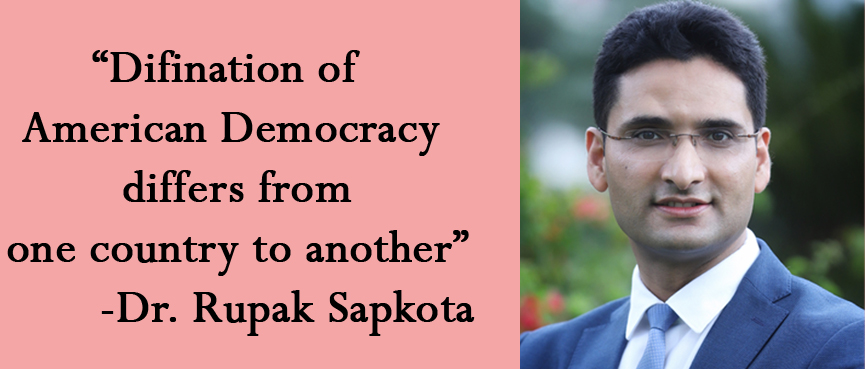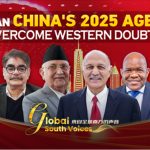“Difination of American Democracy differs from one country to another”-Dr. Rupak Sapkota

Kathmandu, 2021 December 8, Wednesday / The US-led Democracy Summit is scheduled to be held on December 9 and 10, 2021. America has selected the countries that can participate in this summit. However, many countries are left due to the interest of United States. The world has been watching closely the diverse views and heterogeneity that have been analyzing the democratic norms and values in the entire world. Even in USA many antidemocratic and undemocratic incidents have been taking place in recent days
America’s balance of power in the world’s politics is shifting and weakening in recent days. As a result, US leadership is facing a shift in the balance of power rather than promoting democracy and democratic values. Therefore, United States is now organizing a democratic summit considering these all issues.
It can be said that the countries that have been invited in the summit United States has been pursuing such strategies and programs for the last few years. The conference is entitled Summit for Democracy however, conference has raised a suspicion that it may be reflected only to the power nations or some other countries.
The last few years have seen a split in world politics. Many countries in the world have been promoting democratic norms and values. If they are not allowed to participate in this huge conference, there is a danger that it will intensify a divisive situation in world politics.
US has invited Taiwan, its integral part, as a separate country, not China. As developments in world politics continue, the relationship between China and the United States is shifting from rival to rival, leading to the outbreak of a new Cold War around the world.
The recent US-led Oakas agreement with the UK and Australia, as well as the Kadak structure, have bitterer bilateral relations and relations between the US and China, two major trading partners. The move of US to invite Taiwan, an integral part of China, to the summit has shattered the US recognition of Taiwan as an integral part of China. It is clear from the various strategic campaigns being carried out by the US in recent times that it is directly or indirectly involved in a frightening campaign against China. Nepal has been promoting bilateral partnership with China as a member of the BRI. The MCC project put forward by the United States has been the subject of great debate in Nepal for the past two years.
The additional provision requiring the MCC to be approved by the House of Representatives of Nepal has led to serious debates over issues such as Nepal’s sovereignty and national security. On the other hand, political parties and civil society have shown interest and responses to the project, including the protection of physical assets. The debate has also been holding on US presence in Nepal and US’s influence in South Asian region. Therefore, it is urgent need to address by the political leadership of Nepal on the serious debate with Nepal’s national interest and people’s aspirations at the center.
Currently, there are debates over MCC in Nepal from two angles on behalf of civil society and political parties. Nepal should address the concerns and issues raised by civil society prior to decide about the MCC, otherwise, it is very difficult to achieve to goal of national independence, Nepal’s security and economic development and prosperity in the true sense of the word.
Nepal is committed to the one-China policy. Nepal considers it its duty to address the security interests and sensitivities of both China and India. Nepal has long made non-aligned foreign policy and the principles of the Panchasheel as the key of its foreign policy.
Therefore, prior to accept the MCC agreement or any other agreement, it is important to consider whether the agreement is against the security interests and sensitivities of Nepal’s neighbors or not. If those agreements or projects are against Nepal and the Nepali people and against our neighbors, we will never make the mistake of accepting such projects.
Likewise, we must be careful not to interfere in the cordial and friendly relations that we have with our neighbors at the economic, social, and political levels. So that no other country may conspire against our neighbors under any cause. This also applies to the MCC project in Nepal.
Various views are being developed on the issue of looking at democratic values and human rights. There was a time when, after the end of the Cold War, US monopoly power was established and most of the countries that adhered to the values and beliefs that the US had put forward were considered democracies. But what we have been seeing in world politics lately is that even the countries that have not adhere to the democratic values advocated by the United States are cooperating with the US in a friendly and intensive manner. The US is not raising the issue, despite the shrinking democratic practices in those countries. There are also countries that cooperate with the United States, and the US is taking their cooperation easily.
America has been disagreeing with the issues of countries that differ with the US ideology or system. That is very sad. Lately, as US dominance has weakened, its leadership in the world has waned, and its strategy has shifted. It seems that the issue of human rights raised by the US on the issue of China should be linked to the issue of global balance of power. It seems that the US has to accept the current system of governance in different countries of the world.
There are also allegations that the character of America is double standard. Although the countries that accept and lead US policies are not democracies, the US has been a partner or invited to world conferences.
In that sense, the America is called a double standard democracy because it treats one group or some countries with accusations of democracy or human rights but treats countries and rulers who are willing to act in their own interests with respect, support and partnership. The United States has called some countries “democratic” and some “undemocratic” based on its own interests .
Dr. Rupak Sapkota is a former deputy excutive director of institute of foreign affaier, Nepal.










